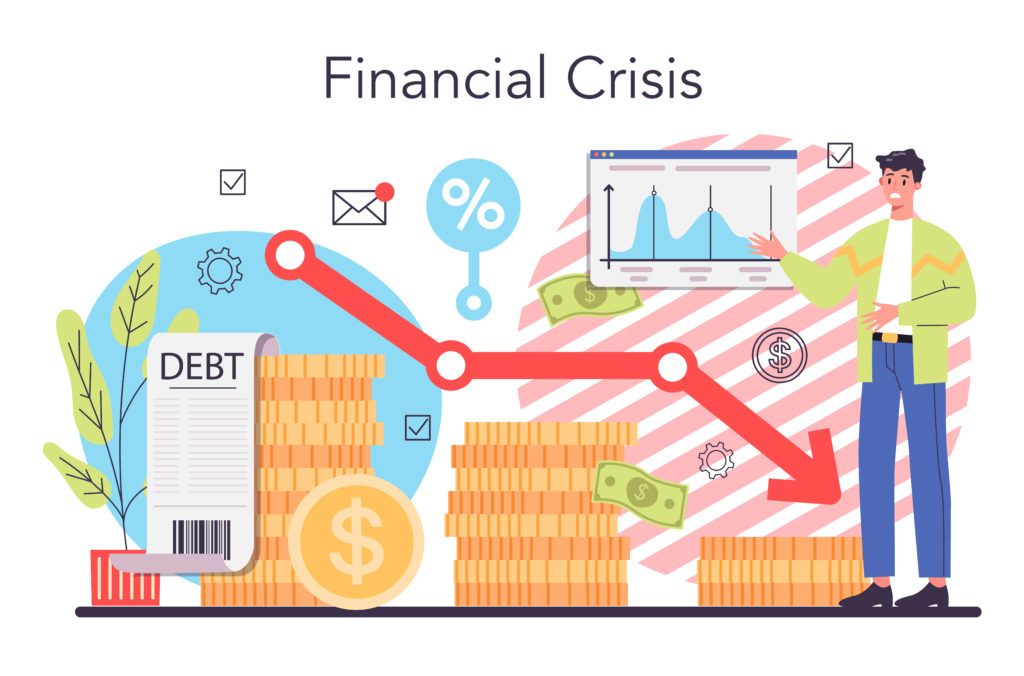The world economy is moving towards an irreversible decline which is exacerbated by war, financial crisis among other issues. In retrospect, this has happened many times before history. To name a few, we had the Great Depression (1929-1933), Asian Financial Crisis (1997-1998), Dot-Com Bubble (2000-2002), Eurozone Crisis (2010-2012) and the Global Financial Crisis (2007-2008). Although, the economy is known to have bounced back, its effect on individuals, households, businesses and government is disproportionate.
The causes of this crisis are indeed numerous. However, all are usually pointed to – bad debt. Debt is one of the major causes of financial crisis as individuals, corporate and government spend more than they earn. There’s a short term debt cycle and there’s a long term debt cycle. The latter usually leads to a heavy financial crisis as debt becomes too much to control and manage. When this occurs, those with real financial assets wins against those who doesn’t as wealth is being transferred to those who have real asset.
The modern economy’s trend towards financialization, where financial markets and institutions play a more prominent role, can contribute to increased volatility. Complex financial instruments and interconnected markets can amplify the impact of economic shocks. This financialization of the modern economy is one of the mega-threats facing humanity today.
One of the primary causes of financial crises is the accumulation of bad debt. This occurs when individuals, businesses, or governments take on excessive debt that they are unable to repay, leading to a torrent of financial problems. The short-term debt cycle, characterized by fluctuations in economic activity over a few years (eight or ten), can lead to over-optimism and risky financial behaviour among these entities. When combined with a more extended long-term debt cycle, where debt accumulates over decades (seventy-five to hundred), it creates a volatile mix that can result in a severe crisis.
During a financial crisis, there is often a significant wealth transfer from those who do not possess real financial assets to those who do. Real assets, such as tangible investments and well-managed businesses, tend to retain or increase in value during economic downturns.
Though, the impact of this crisis is highly disproportionate among these entities, it’s usually bad for household and businesses. Financial crises can lead to widespread job losses, reduced income, and increased levels of debt for households. Home values may plummet, affecting homeowners’ equity, and access to credit becomes constrained. Businesses often face a challenging environment during financial crises. Reduced consumer spending, limited access to credit, and market uncertainties can lead to bankruptcies, closures, and downsizing. So, the interconnected nature of the global economy means that a financial crisis in one region can have a cascading effect worldwide. Trade declines, investments shrink, and global economic growth slows down.
Since this have become almost inevitable for individuals and businesses, there’s a need to navigate through this problem in order to survive and stay afloat with minimal risk. It’s essential that entities diversify their investments and revenue streams to spread risk. Robust risk management practices, including stress testing financial scenarios, can help anticipate and navigate crises. Avoiding excessive debt and maintaining manageable debt levels is crucial. Establishing emergency funds and having contingency plans in place can provide a financial cushion during challenging times. Businesses should adopt adaptive business models that can withstand economic shocks. This may involve diversifying product offerings, maintaining strong cash reserves, and staying agile in responding to market changes. On a global scale, international cooperation is essential to address financial crises effectively. Coordination among governments, central banks, and international financial institutions can help stabilize markets and support economic recovery. Putting these in place is one safety net for anyone who’s concern about their financial position.
Understanding the causes of financial crises and their impacts on households, businesses, and the global economy is crucial for developing strategies to navigate through these challenging periods. Prudent financial management, risk mitigation, and adaptive approaches can contribute to resilience and recovery in the face of economic downturns. Financial crises are complex events with multifaceted causes, often involving a combination of economic, regulatory, and behavioral factors. Governments and central banks play a crucial role in responding to and mitigating the impacts of such crises. Individuals must also take responsibility into their own hands.

